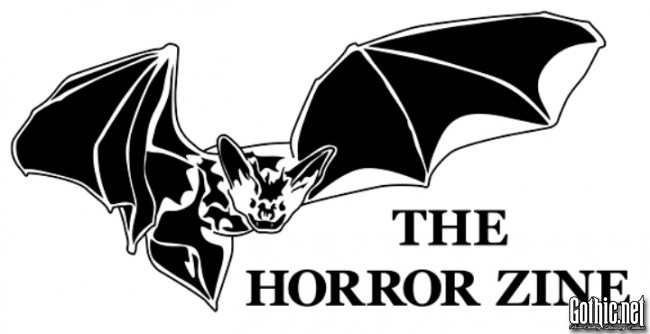Gothic Beauty Magazine #53: A Velvety Blend Of Gothic Flavors 29 Sep 2023 5:37 PM (last year)
Gothic Beauty Magazine, issue #53 offers sweet warmth, like that first taste of fine wine on the lips, with the appearance of the gorgeous Twiggy on the cover, posing in a delicious style while wearing the amazing LashyDoodle Gothic Double Drama Kit eyelashes. I’m looking at the digital edition right now, but it also comes in a Gothic Beauty Magazine print subscription.
A drop of personal artistry becomes an abundant pour of self-expression through the engaging artefacts that this issue features to help add a playful touch to our lives with stylish phone cases, aprons and lip stains, a gothic bag, rings, a soap bar shaped like a tombstone and even dog chew toys with a gothic twist, because our fluffy companions also deserve an exceptional treat, and on the subject of beloved pets, Issue #53 shares a closer look at Hyde Park Pet Cemetery in London, a moving look at the farewells to people’s beloved companions and all that comes with it in a unique tour through history.
This full-bodied issue of Gothic Beauty Magazine also surprises with zesty interviews with Kassandra Love and her Katakomb fashion brand, inspired by a fabulous Southern Gothic Style. A conversation with the creators of the superb Nyctophilia store, and a tasteful interaction with Ben V where he shares more about the incredible art of his industrial gothic metal band Ludovico Technique.
In a sweet sip with strong hints of stimulation for the mind, this edition takes us to unexpected places with book reviews of The Art of Darkness The History of Goth by John Robb, Rock’N’Roll Witch by Pleasant Gehman which includes lots of gripping personal anecdotes and experiences; Stoupakis: Genesis, an art book by David Stoupakis where the artist’s mind and the artwork itself come together in mesmerizing harmony, and The Ruin Of All Witches: Life And Death In The New World by Witchcraft historian Malcolm Gaskill which details the disquieting story of Hugh and Mary Parsons in Springfield.
The world of fashion and beauty swirls with a wonderful coverage of the first edition of the Alt Trade Show, which has the noble purpose of reviving the trade shows where alternative clothing brands can mingle and meet shops to work together with.
LashyDoodle, and their amazing new Lookbook make a splash with lots of styles of lashes and gorgeous models wearing them; and in a stunning exploration of romance, the tale of the creative and heartwarming proposal of Marc Fuerst to his gothic love Hilary Branner is the perfect cocktail of hope and celebration.
For music, the delicate notes of Gothic Beauty feature reviews of Killing Joke’s MMXII album, Depeche Mode’s Memento Mori, Miss FD’s As Above So Below EP, The new album Death of Darkness by The 69 Eyes, Just Like Heaven, a work of art where various artists collaborate in a tribute to The Cure; and many more musical suggestions, all with a great coverage of what the albums contain, the genres they explore, and why they are the perfect melodies that enrich our libraries.
There are also visual treats to pair with the spectacular sounds as well, with an in depth look at Omnimar’s The Matrix music video, which presents a futuristic aesthetic as an homage to the titular movie. Baby Storme’s This City Is A Graveyard, where she dances among the tombstones while singing of joys forsaken, and Blackbriar’s My Soul’s Demise, which tells an inspiring visual story that warrants more than one watch to absorb all the greatness contained within.
La dernière goutte of deliciousness from issue #53 comes for us to savor in a flavorful coverage of the Wave-Gotik-Treffen festival, complete with plenty of amazing photographs of the styles people have worn to the event in a nice little treat of all the possible fashion avenues to explore, which presents a rich finish to this fantastic edition of Gothic Beauty Magazine.
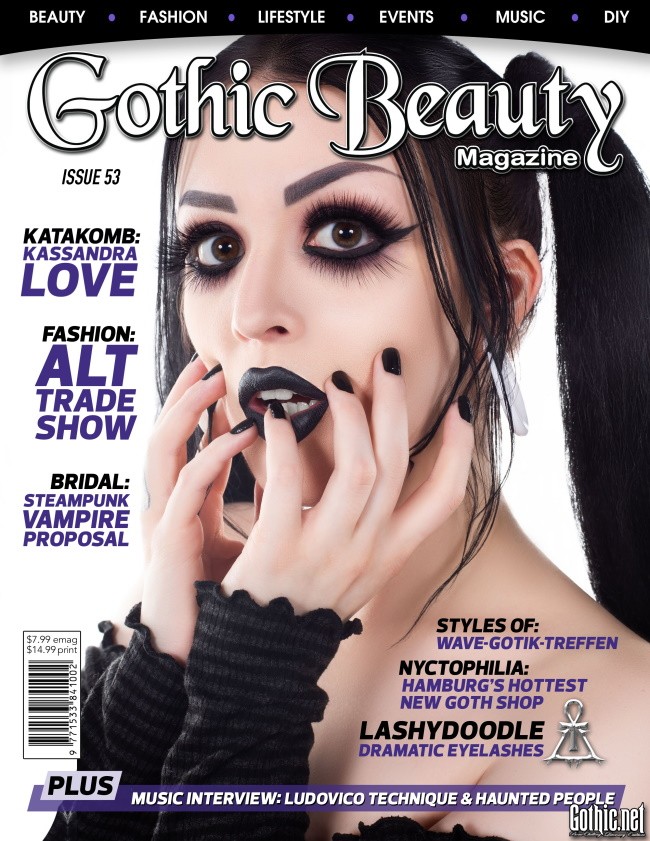
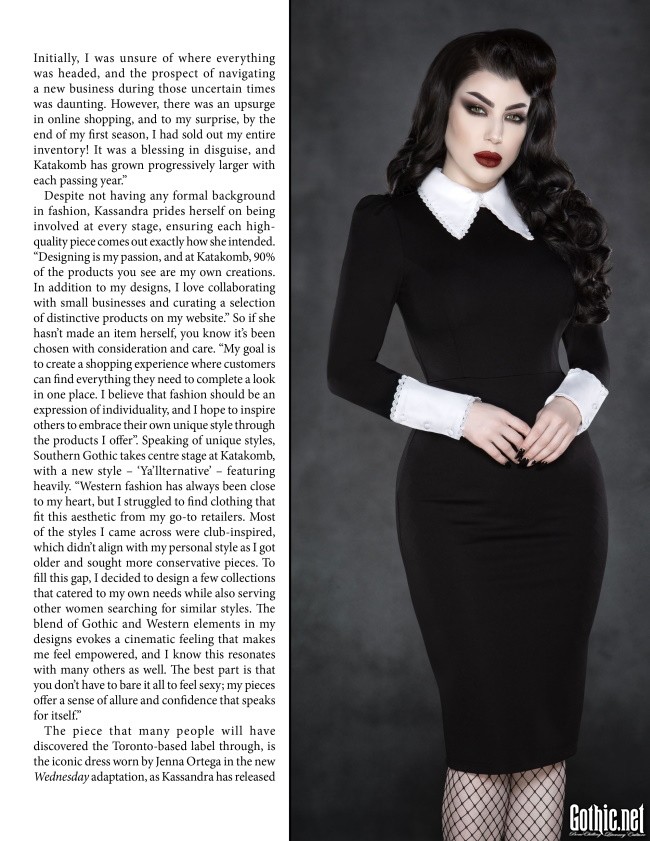
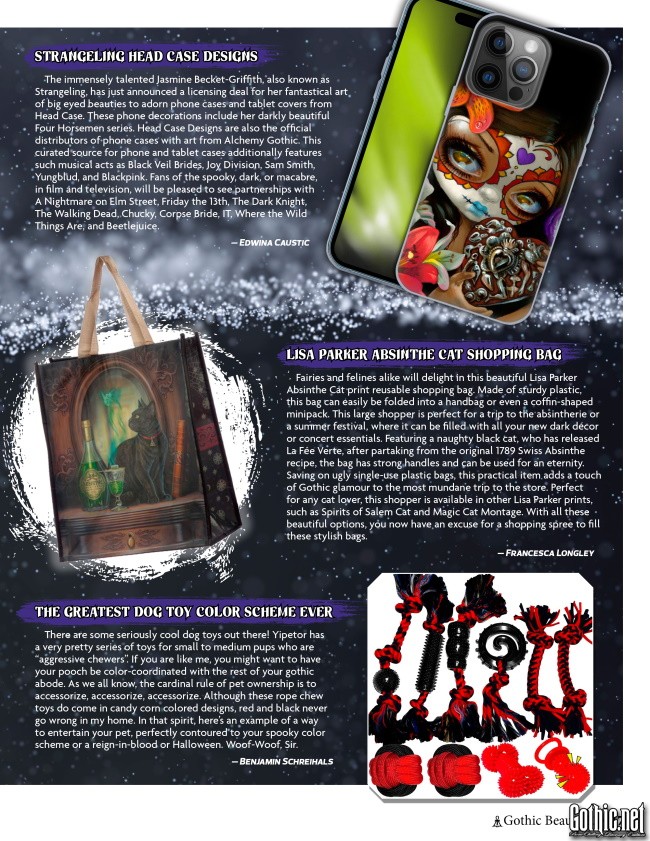
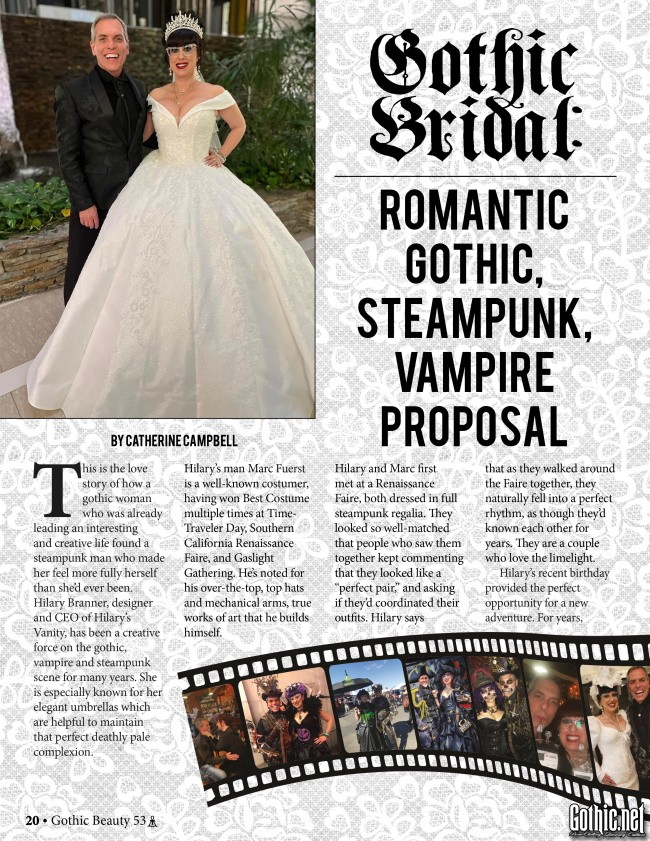

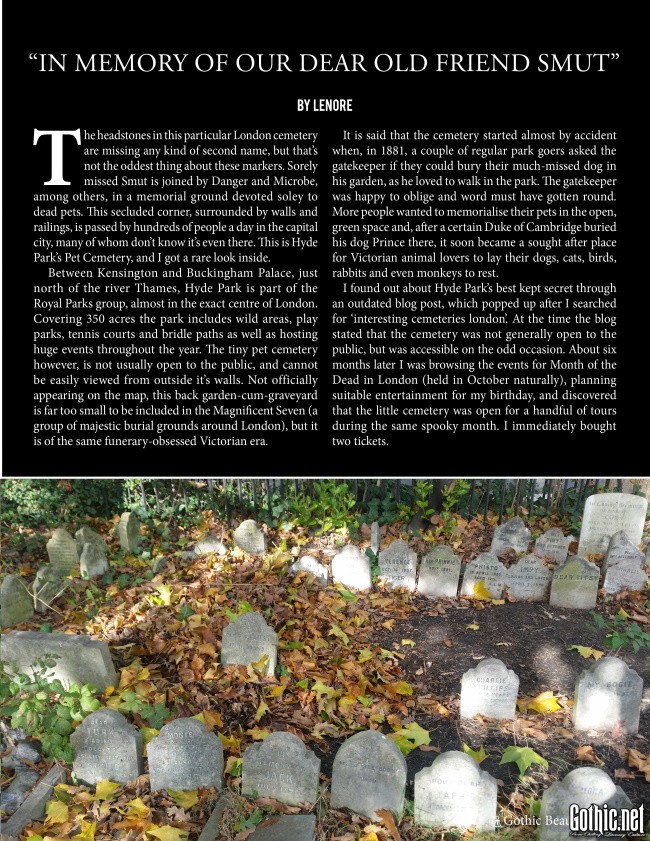

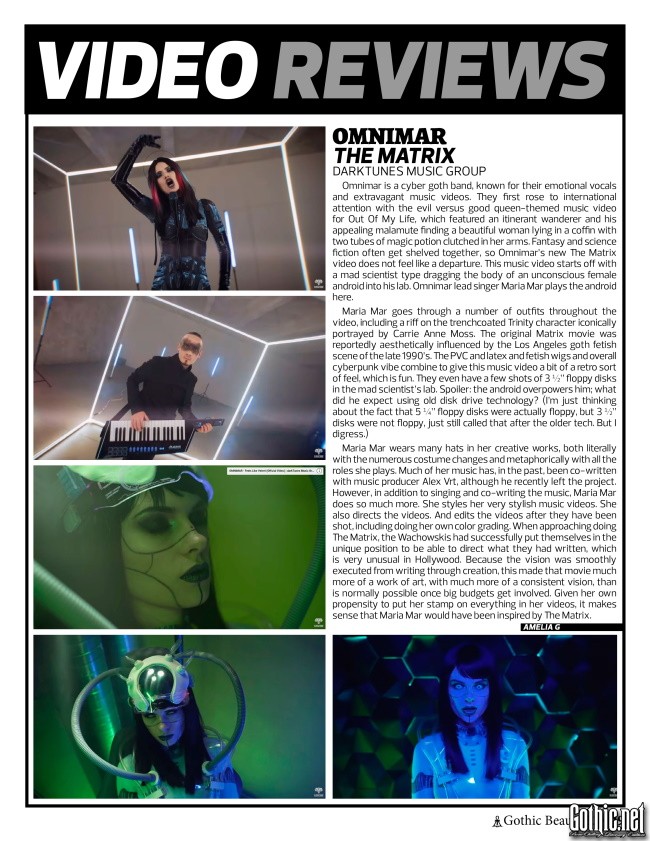
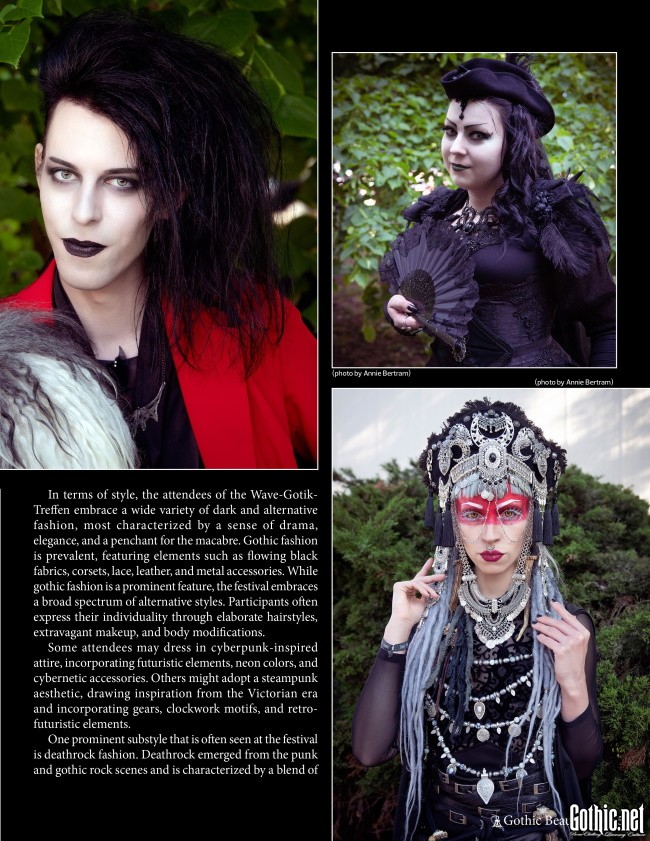
Shiny Fantasy Unicorn Makeup Tutorial 29 Sep 2023 4:06 PM (last year)
NsomniaksDream has the idea that not all Halloween makeup styles need to be spooky to be effective for this season, and to prove it, she prepared this incredible Unicorn makeup tutorial for you to be able to recreate the look and see for yourself how right she is, because you can totally rock this look at your next party.
The Unicorn makeup focuses on pink colors, and it takes special attention to the eyes, where you can see that NsomniaksDream uses a black eyeliner and fake lashes to highlight her eyes a bit more, and she also includes a white line on her lower eyelid that helps add that innocent and magical appearance to her gaze, which is exactly how I imagine a unicorn’s eyes would look if it stared at you.
This style also incorporates some props to complete the Unicorn concept, so a crown with the horn and a pink wig are added to bring some more elegance to the look, and NsomniaksDream also uses some jewels and glitter to enhance the shiny and magical feel of the overall makeup.
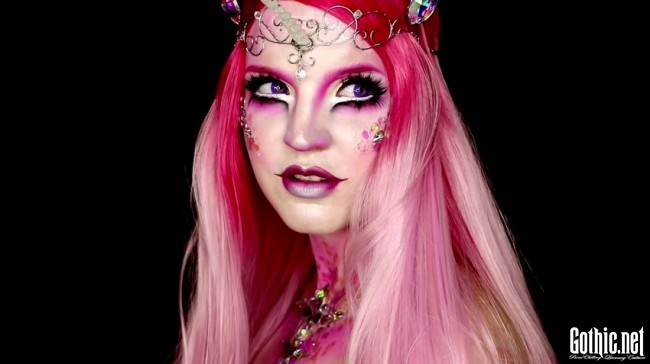
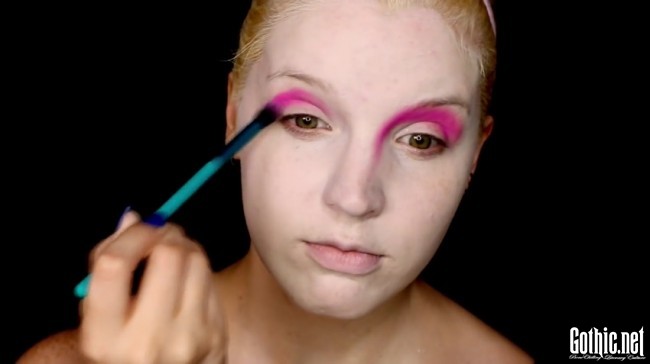

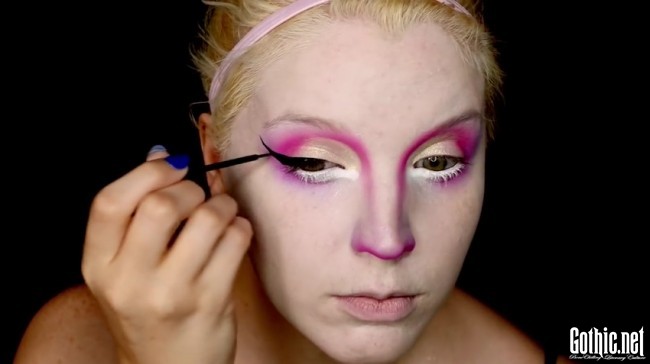
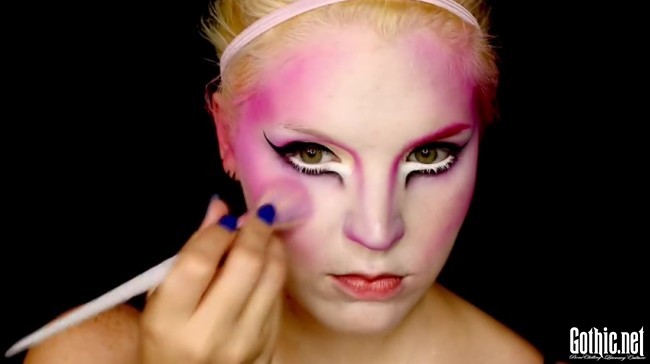

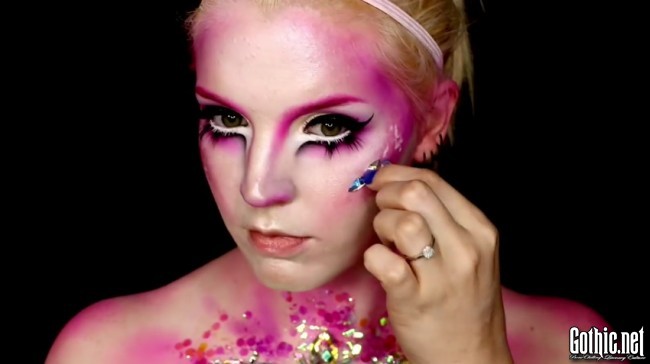
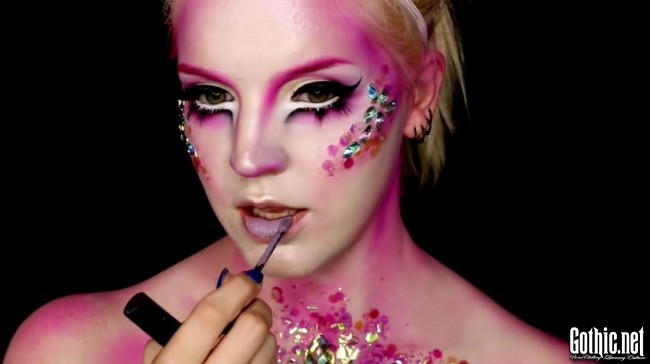
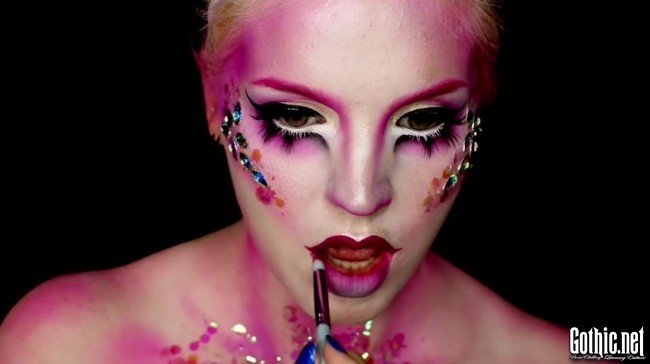

Thought I was overdue for a proper Unicorn makeup tutorial perfect for Halloween or your next fantasy party!
Not all the looks for Halloween can be creepy and terrifying right?
OK they absolutely COULD but I wanted some color and glitter in the line up for this year ;D
Hope you guys enjoy this one, let me know your thoughts!
______________________________________________________________
TWITCH: https://www.twitch.tv/nsomniaksdream
Instagram: https://www.instagram.com/nsomniaksdr…
Twitter: https://twitter.com/NsomniaksDream
Facebook: https://www.facebook.com/NsomniaksDream/
_________________________________________________________________
PRODUCTS I USED:
~ NYX Total Control Drops Foundation*
~ NYX Pro Foundation Mixer: White
~ Ben Nye Neutral Set Powder*
~ SUVA Beauty: Cupcakes and Monster Palette: Shadow colors:
Sangria Sundays
Funny Face
~ Make Up For Ever: Artist Palette Vol. 3*
~ GOSH Iridescent Eye Pigment (Discontinued)
But any shimmer white shade or gold would work
~ NYX Jumbo Eye Pencil: Milk*
~ NYX Matte Liquid Liner*
~ Smashbox X-Rated Mascara*
~ Lashes were admittedly a no name set of 10 pairs from a beauty store
~ The Gypsy Shrine Diamond Chest Piece
~ The Gypsy Shrine hair face and body glitter:
Dark Unicorn
Rainbow Pink
~ Pros Aide skin adhesive*
~ Teardrop Light Crystal AB Acrylic Special Effect Rhinestones
~ Sigma Beauty Liquid Lipstick: Fox Glove*
~ Sephora Liquid Lipstick: Wisteria
~ Wig is from PowderRoomD
~ Primal Lenses: Phantom
~ UNICORN CROWN Created by Wire Princess
A Celestial Presence – Halloween Makeup Tutorial 31 Aug 2023 6:32 PM (last year)
Want to experience what it’s like to be an angel for Halloween?
If that’s the case, then Danika Daisley’s got you covered, because she’s prepared a super easy and quick tutorial for you to recreate her look, which portrays an angelic style that makes you look as a celestial being with porcelain skin, eyes that seem to survey the land with a deep gaze, and a face adorned with gems and gold, which further accentuate the divine look by bestowing upon it an magnificent energy that one can only expect from a being that was created in heaven to inhabit and protect it.
Something noteworthy about this style is how it portrays an angel not with a warm and friendly appearance, but with the commanding qualities that angels are supposed to have, since they are often described as beings that strike fear into the hearts of those who see them, even if they are emissaries from heaven, and the style captures that grand nature flawlessly.
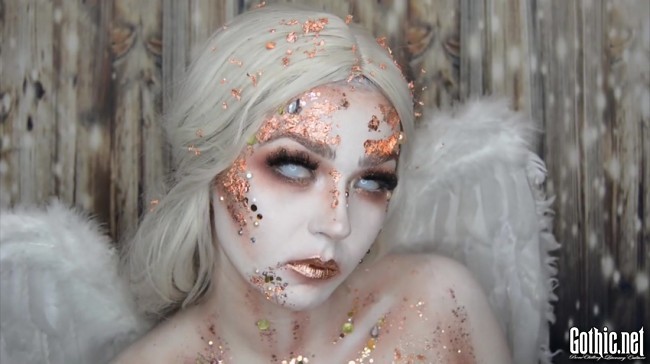
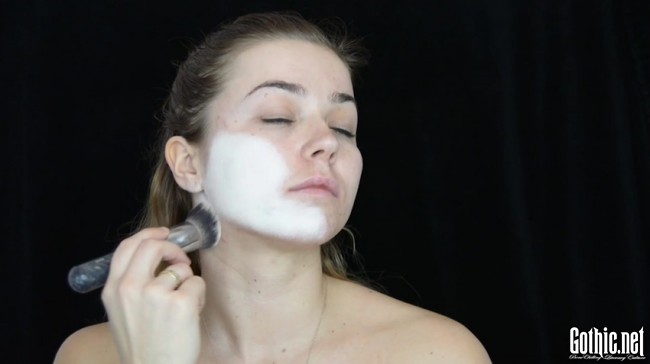

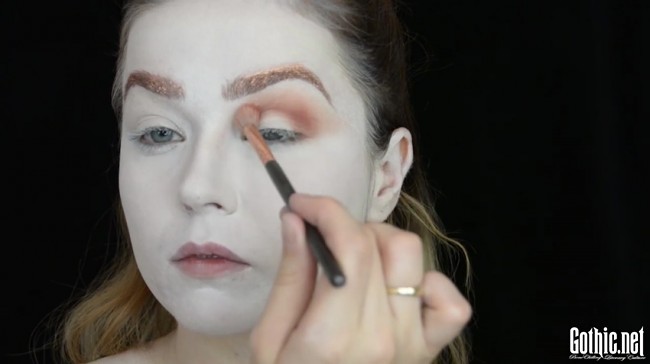
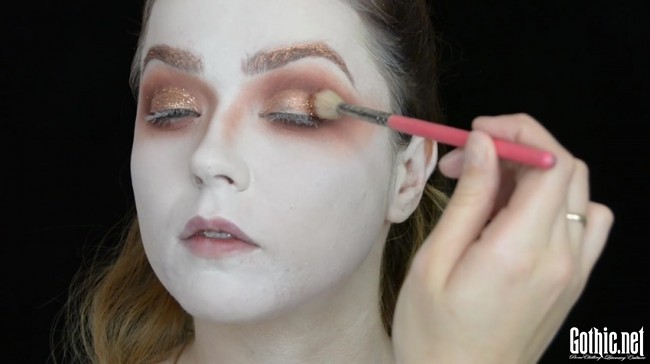
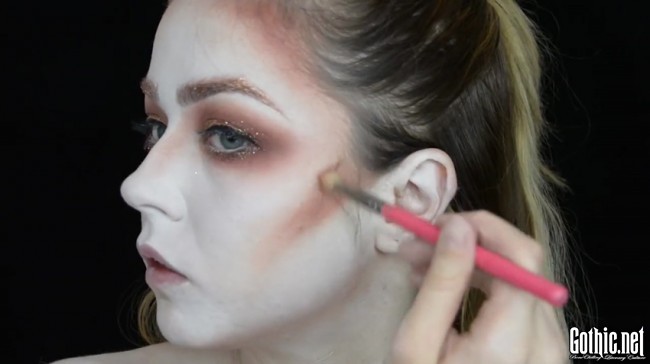
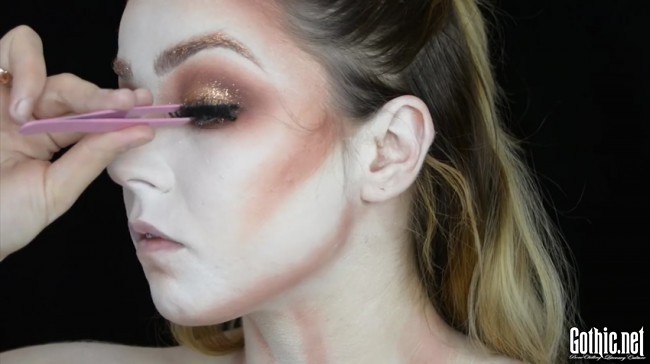
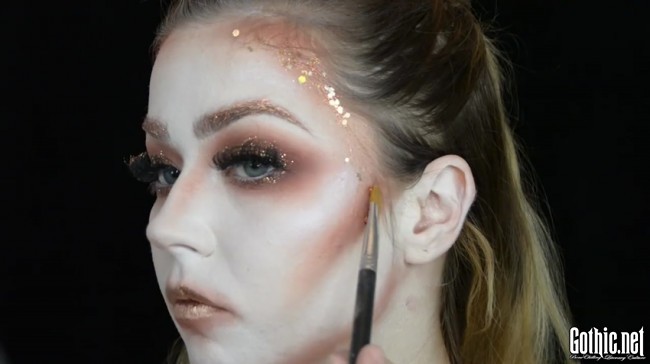
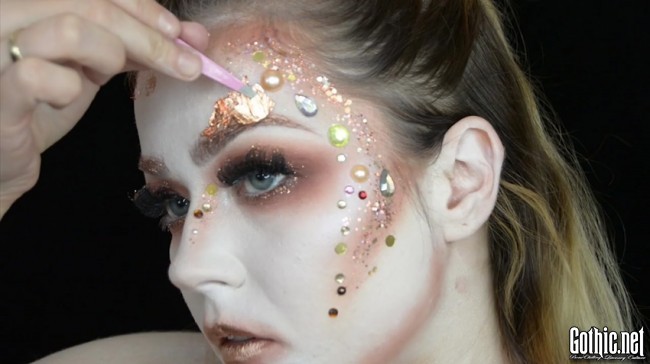

heres a quick 1 min clip, enjoy
Danika
xoxox
The Horror Zine’s Book of Monster Stories Submission Guidelines (Paying Market) 15 Apr 2023 8:50 PM (2 years ago)
The Horror Zine, founded by award-winning editor and writer Jeani Rector, is currently reading for a monsters anthology. Full guidelines are on their site.
We are looking for monsters, creatures, beasts, mutants, monstrosities, frightening oddities, malformations, altered insects or animals, mythical creatures, monsters from space or from bodies of water, or something we can’t even imagine but you can.
We are not looking for vampires, werewolves, mummies, or Frankenstein (unless it is something totally unique). We are not looking for ghosts. We are not looking for human beings.
All stories must be original: never before published anywhere. Word count is between 2K and 5K words. All submissions must be on Word or RTF (no PDFs), single spaced, with 0.3 indentations of paragraphs. Please do not use the space bar over and over to create paragraphs indents.
We are accepting original story submissions beginning on February 1, 2023 and ending May 15, 2023. We do not accept simultaneous submissions.
Payment will be $20 upfront per accepted story in lieu of a contributor’s copy. Of course, the theme is monsters.
Story acceptance will not be easy, so please only submit your best works to thehorrorzine@gmail.com. Please put the words “Monster Anthology” in the subject line of your email.
Gothic Beauty Magazine Issue #52: A Feast Of Gothic Artistry 28 Feb 2023 8:43 AM (2 years ago)
The arrival of issue #52 of Gothic Beauty Magazine is as sweet as a kiss from our favorite vampire, and it is ready to charm our hearts and minds from the first enticing look at the beauty of Acid Doll gracing the cover while wearing one of the stunning designs by Lena’s Wulgaria, who gives an in-depth look at her work and dark fairy-tale couture style through an interview in this gothic journey.
This issue comes like a ray of caressing moonlight that parts the veil of darkness with its sterling topics and interviews with talented artists, designers, and gothic personalities like Aurelio Voltaire, who introduces his new album The Black Labyrinth, made as a musical tribute to David Bowie. The beautiful Minnie Opal presents a unique and heartwarming project with Sundari Franklin that serves as a homage to a loving and loved departed soul. Henry Zebrowski from The Last Podcast on The Left participates on an intriguing little chat about the paranormal; and Micheline Pitt and Lynh Haaga also introduce us to their fantastic designs through a dark and playful collection based on the aesthetic of Beetlejuice.
There are many tasteful escapades that Gothic Beauty Magazine issue #52 takes us through as it guides us into the furthest depths of gothic culture, and it continues the adventure with an engaging history lesson about battle vests, their versatility and established fame in both the gothic and punk scene; as well as a myriad of reviews for us to indulge in some masterfully created books, albums and music videos, like Sam Smith’s Unholy video featuring Kim Petras; Miss FD’s Summoning; and IC3PEAK’S Kiss Of Death. For books, the reviews focus on texts of macabre, fashion and memoirs with reviews of Drumming With Dead Can Dance & Parallel Adventures: A Memoir by Peter Ulrich, and Gothic Fashion The History: From Barbarians To Haute Couture by Katie Godman, among other nice little page turners; and as for music albums, the selection focuses on classic goth bands Clan of Xymox and their album Limbo; Siouxsie and The Banshees and their collection of iconic songs called All Souls; as well as The Birthday Massacre’s Fascination album, which are just a few of the melodic gems we can find here that help enrich our musical libraries.
Fashion has a strong focus through this issue of Gothic Beauty Magazine, which is why the coverage of the MAGIC Fashion Trade Show is so welcome and appreciated, especially with the thorough look at the designs that made an appearance at the event, making it even sweeter when this issue also suggests and introduces a series of accessories and makeup palettes to add a bit more style to every personal gothic endeavor, as well as a detailed look at some creative cake toppers to add an unforgettable flair to the perfect gothic wedding.
Issue #52 of Gothic Beauty Magazine is a spectacular celebration of goth that even serves as a tempting portal both for those who are taking their first steps in their gothic journey, and for seasoned children of the night alike, and it does it smoothly through every line and glamorous image that makes this a true work of art in Gothic Beauty, and it even comes with one extra treat for those who can’t wait to feel the warm embrace of this gothic experience, since, for a limited time, fans can get a free digital copy of the magazine through Zinetastic, using secret code gb52love as well as place an order through this same distributor to get the coveted Gothic Beauty print edition to add to their collection.
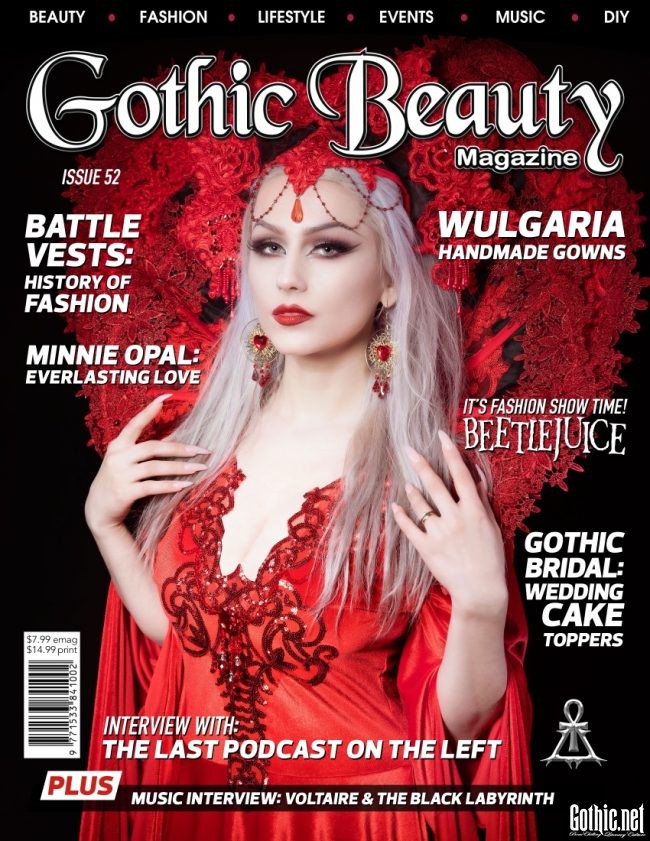


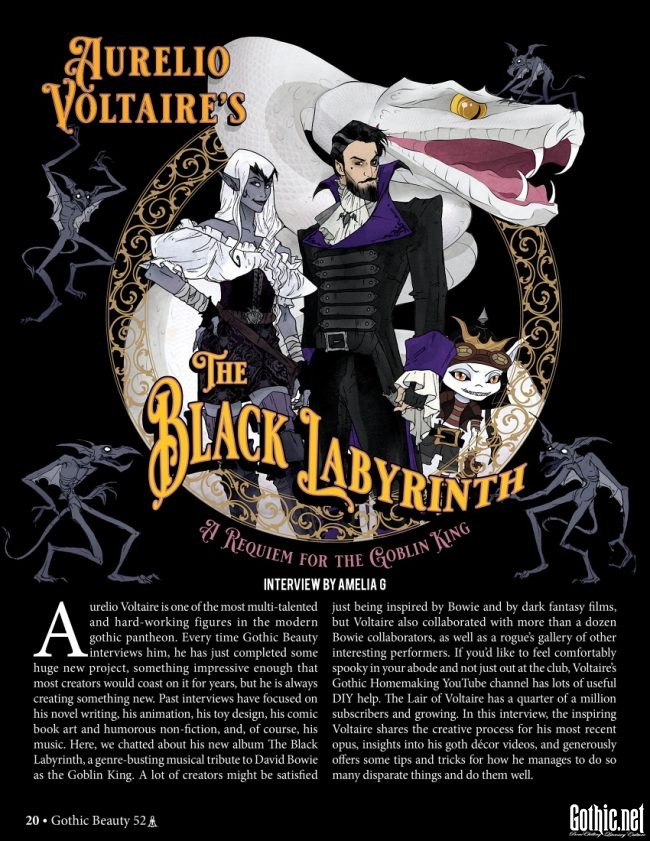

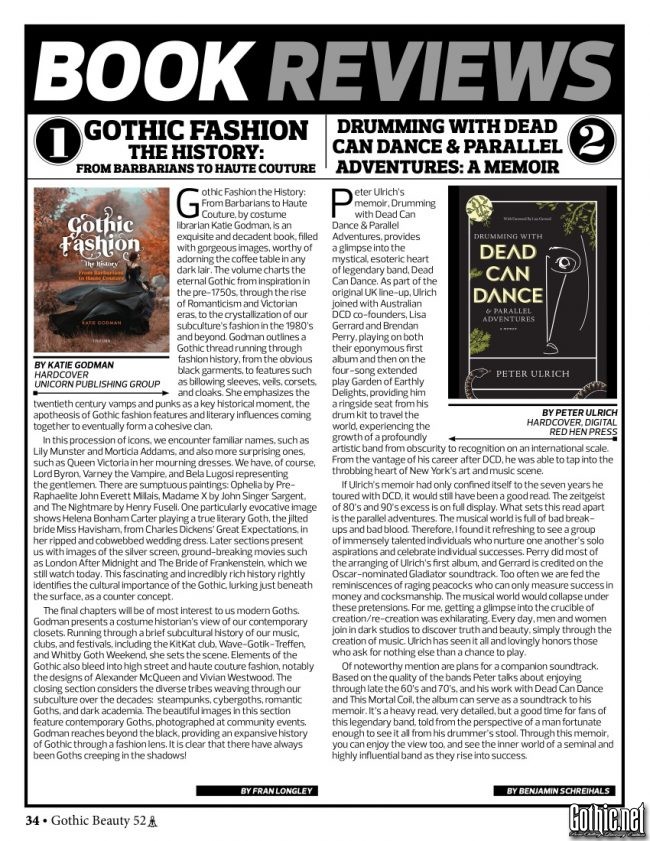

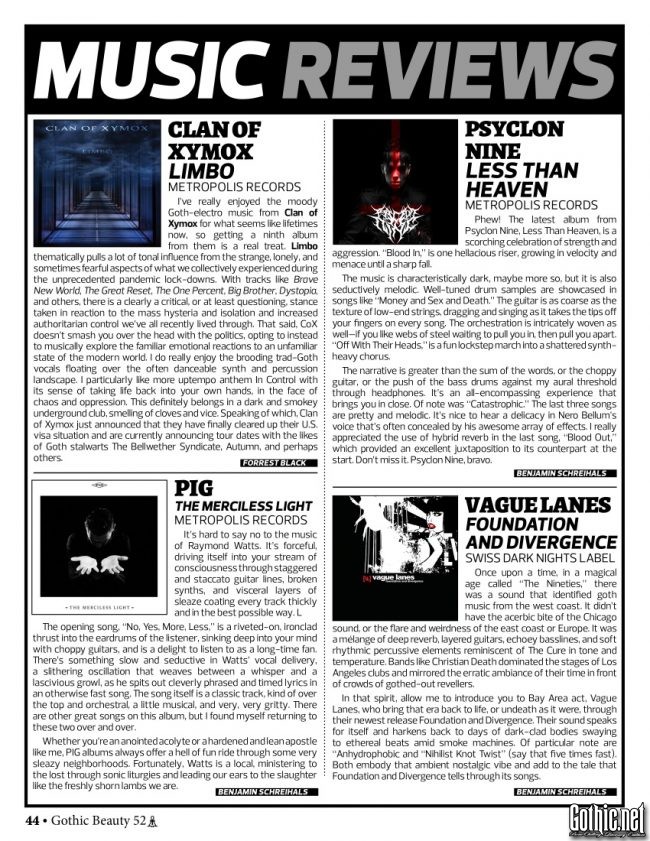
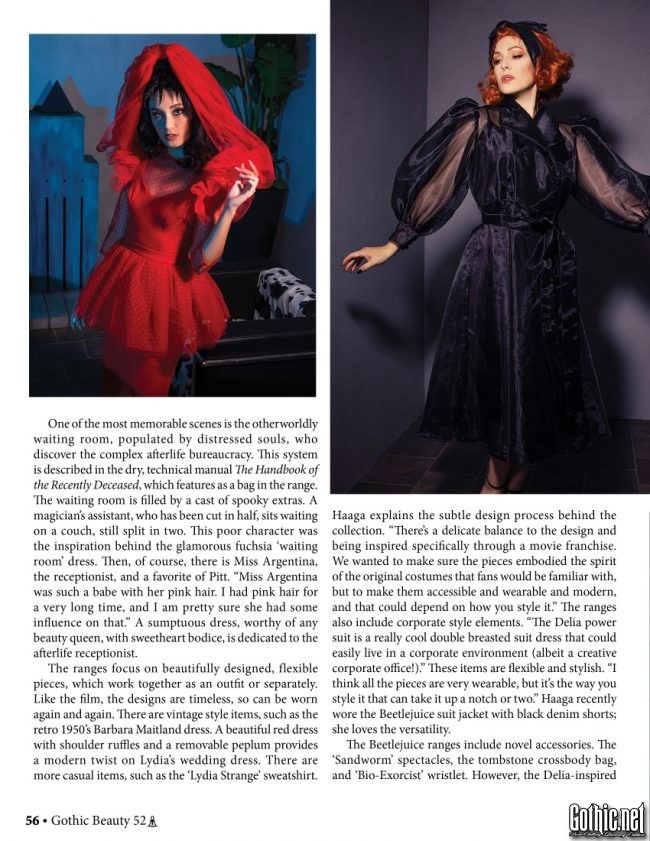
Panel of Experts: How do you feel fiction-writing and screen-writing compare? 24 Feb 2023 6:36 PM (2 years ago)
Question: How do you feel fiction-writing and screen-writing compare?
Gothic.net’s Panel of Experts weight in on the ways fiction-writing and screenwriting compare. Some of our experts feel writing fiction allows for more intricate character development and internal monologues, while writing for the screen requires a tighter focus on action and dialogue. Some find that writing for film or television requires more collaboration with directors, producers, and actors, while writing a novel or short story allows for more solitary creativity. Some find it all comes down to the differences in paycheck. Some have discovered that writing in one medium has helped develop skills and techniques that transfer well to the other.
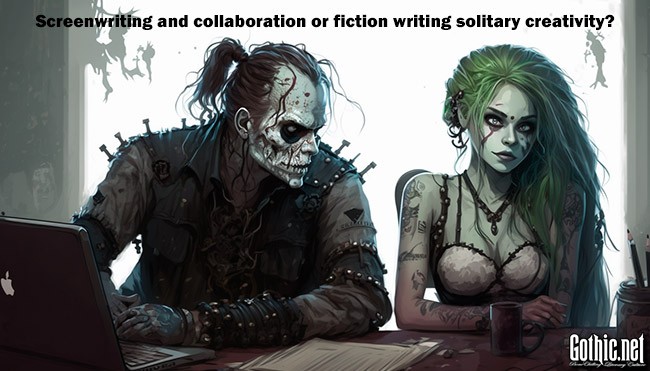
Way too long a question at the end of an interview. But writing is writing. The process of storytelling is the same. You can cheat as a screenwriter – in a novel you have to give your reader every second, every experience in the whole story. But screenwriting is a lot harder to do well than people think.
—Alexandra Sokoloff, writer
They require two completely different skillsets, as far as I can tell. I’ve only written one produced script for a short film, but it was a vastly different experience than anything else I’ve done.
—Bev Vincent, writer
SOMEWHAT
—Bob Johnson, writer
They compare in that with both you need an ability to plot and allow plot to grow logically out of character motivations. But screen writing is a unique exercise where you don’t get to use ANY of the prose craft you develop as a fiction writer. You are limited to only what the viewer can see or hear. What makes prose fiction is all the other stuff, the implications, the internal monologues, the indirect discourse, the voice of the narration and the authority of the prose. All that’s gone in a screenplay, filled in by the artistry of the actors and cinematographers.
—Cecilia Tan, writer
I’ve checked “screenplay” off my bucket list, and I hope I never have to do it again. My screenwriting instructor, Dan Decker, hopes that, as well. Poor Dan struggled with my tendency to write “long.” “TWENTY-THREE WORDS!” he’d say. I’m not cut out to write screenplays and, besides, you have to be a certain age or they won’t hire you, even if you’re terrific.
—Connie Corcoran Wilson, writer
As a screen writer you have to be much more descriptive with the character’s emotions, their MO’s. The scenery is well noted, the interaction between characters must be made clear. You generally have less time to impress things upon a watcher than you do a reader.
—Corrine De Winter, writer
They’ve both done well for me. I got into screenwriting five years ago and found it exhilarating – and fast. I started with converting a few of my short stories into screenplays (the short format makes it very comparable), then went on to adapt two of my novels. I try to write at least one of each per year.
—David Sakmyster, writer
DIFFERNT FORMATS BUT STORYTELLING IS STORYTELLING
—Del Howison, writer
They are very different. I have seen the screenplay for one of my books and they are world’s apart. I prefer to take my time to set out a scene where a screenplay limits the writer to how the scene looks.
—Derek Gunn, writer
Most great stories, whether they’re on screen or on the page, boil down to the same basic concepts: they throw compelling characters into compelling challenges with compelling outcomes. The main difference is how those stories are conveyed, mechanically and aesthetically. Screenwriting demands an entirely different format than fiction writing, and the writing style itself tends to be very cut-and-dry. In that way, I like to think of scripts as story outlines with dialogue: the experience isn’t complete until the screenplay is made into a movie. Novels, on the other hand, are whole; the author is solely responsible for shooting, directing, lighting—all of that.
—D. L. Snell, writer
I think it’s like comparing cats to dogs. They’re both mammals, but are very different in many way. Cats (fiction-writing) are aloof and sexy. Dogs (screen-writing) are friendly and lots of fun.
—Elizabeth Blue, writer
Never tried a screen play, so can’t say.
—G. O. Clark, writer
Good writing is good writing. As Alexandra Sokoloff so succinctly put it, you can learn to write a good novel by paying attention to how a good movie is structured. And vice versa, I suppose.
—Gene Stewart, writer
I think screen writing is of course a different format, but it’s still partially writing fiction. Except for documentaries, I can’t think of purely factual screen writing. Even when writing about a historical/real-life fugure, there has to be fiction in the shape of imagination – even if the writer doesn’t like it! I’d be amenable to that if someone took one of my present books for the screen.
—Helen McCabe, writer
They are two different genres and shouldn’t be compared. I am not sure that readers who want to immerse themselves in a horror story would pick up a screenplay to satisfy that craving. Reading a screenplay is not the same experience as seeing a movie.
—Jameson Currier, writer
Completely different disciplines. The former is far easier to sell than the latter, however.
—Jean Graham, writer
Not at all. Two entirely different mediums each with their own form and structure.
—Jeanne C. Stein, writer
I don’t know; I’ve never written for the screen (or written a play). I’ve tried and can’t do it. Different parts of the brain are used.
—Jemiah Jefferson, writer
They’re both writing. And then you have to try and sell it.
—J. G. Faherty, writer
Mostly the former pays far poorer than the latter; the latter is more collaborative.
—John Shirley, writer
They’re different equally fun forms of storytelling. Fiction has the responsibility of providing stimulating text that shows the living movement of the story, whereas screen writing tells everything as efficiently as possible so that the filmmakers can capture with film the same concept. There are infinite examples of the two merging. Often it works and we get a Jurassic Park or True Grit, but just as often it doesn’t. Fiction and Screen-writing are like kissing cousins, it’s cute until they have a twelve-fingered kid.
—J. R. Parks, writer
They are just two different ways of telling a story. What many new writers do not notice–I myself took a while to figure this out–is that what people want is to be engaged in a story that makes them feel things; usually, they also want to be able to share the story and the way it made them feel with others.
That story can be delivered via books, movies, videogames, comics, or podcasts, but if the story isn’t engaging the audience in the way they want to be engaged, you’re done. We have many more options for getting our story-itch scratched nowadays than in, say 1911. And there has been an explosion in story-products since then. People, being lazy gits for the most part, naturally migrate to the ones that are easiest to experience and share, like TV and movies. But at the end of the day, it isn’t the medium that matters near as much as the story, the emotions, and the sense of having shared the experience with others.
—Lon Prater, writer
I don’t have any experience with screenwriting.
—Loren Rhoads, writer
They are different techniques but they employ some of the same mechanisms: good visuals, great dialogue.
—Lisa Mannetti, writer
Screenwriting is MUCH easier! And more lucrative (when you can get it)…but ultimately infinitely less satisfying.
—Lisa Morton, writer
They’re two totally different disciplines, with totally different mindsets. I love both, and when the words fly there’s nothing better; but they’re very different.
—Marie O’Regan, writer
The latter is very compact, with specific terminology and format…. It’s hard to get back into prose after writing a lot of screenplays – you find you want to give short shrift to descriptions and sensory impressions, because you’re dead if you do that in scripts… In prose, it’s just the opposite.
—Mark Onspaugh, writer
Screen-writing is a form of fiction-writing that is as valid in our time as any other writing.
—Matt Kennedy, writer
I wrote two screenplays but haven’t sold them yet.
—M. F. Korn, writer
There are many similarities in terms of story, but the execution is so incredibly different. I have done both. Both have structure, but the script structure is far more rigid. You can play more loosely with a novel structure, as long as you get there eventually. If you wander in a screenplay, you’re penalized by the audience. Wander properly in a novel, you’re rewarded.
Also, setting a scene is very different. With a script, you’ve got 2 or maybe 3 short lines. With a novel, you have so much more room, but to me that’s even more difficult because a script will eventually be turned into a visual. The novel will only be visualized in the reader’s head. Difficult!
You can get into your characters’ heads in novel as well, whereas with screenplays, you must rely on character action and dialogue almost entirely.
—Michael J. Hultquist, writer
Very different and because you can do one doesn’t mean you can do the other
—Mick Sims, writer
I refuse to answer that on the grounds that I will just piss off screenwriters, and they keep them locked in little rooms with coffee pots and boxes of donuts. The last thing I need is union card carrying, caffeine and sugar stoked, bleary-eyed screenwriters mad at me.
—M. R. Sellars, writer
Entirely different. Screenwriting is dialogue and action. Fiction requires scene building and description and a lot of interior life to get across the notion of reality. On screen, the actors bring the words to life. In fiction, the writer has to do that on paper.
—Nancy Kilpatrick, writer
Aside from the fact that they both involve imagination, they’re two completely different forms of writing. The screenplay remains a mystery to me.
—Nicholas Kaufmann, writer
It’s far easier to whip out a 90 page screenplay than write a 400 page novel. I’ve written both, but can’t decide which I enjoy doing most.
—Owl Goingback, writer
It is a different skill set. Adapting my work into audio plays was a challenge- as you have to use the narrative and sounds to fill in a scene.
—P. S. Gifford, writer
They’re completely different disciplines, and not every writer can do both, or do it well at any rate. I’m only just starting out with script work and it takes some adjustment from prose, to think more visually about scenes and what dialogue is important. I’m lucky enough to have the background in Film Studies, though – I did an MA in it after the BA – and also think quite visually when writing my prose. It’s been said in reviews that I have a film editor’s eye, in particular one reviewer compared my battle scene between Robert and the Tsar in Broken Arrow to those in Lord of the Rings, which was high praise indeed. But I know I’m still new to it and have a lot to learn, so I read scripts as much as I can to see how the pros have done it. Joss Whedon’s are especially good for this. I’m also fortunate enough to have Marie, who I can ask advice about scripting. She’s much more skilled than I am, as she’s been doing it a lot longer – her stuff is amazing. She’s working on a pilot now that would blow your socks off. So I always go straight to her for any help and am very thankful for it.
—Paul Kane, writer
They don’t. Period.
—Rain Graves, writer
I’ve done both and I think they’re not particularly similar. Screenwriting is a far more rigid structure and is, in some ways, far more competitive than fiction when it comes to its marketability. When you consider that fiction is probably one of the most competitive areas in which to write, that’s really saying something! If I enjoy anything about writing, it’s that fiction let’s you play with the English language—to push whatever talents you have to their maximum capability. While I think that can happen with screenplays, I think that it’s far less common than it is in fiction.
—Richard Dean Starr, writer
I’ve written one screenplay that sits in a drawer. Not really my thing.
—Ryan M. Williams, writer
They’re very similar. The difference: one is internal, the other visual. But I don’t see any reason why a writer can’t do both.
—Sarah Langan, writer
Two completely different animals. Screenwriting has to take into account actors, special effects, what can be created, the budget, etc. Fiction can go anywhere. Characters can talk in their heads more. Language is more available. Two completely different animals.
—Shade Rupe, writer
It’s all fiction really, but screen-writing is done a little differently. The one leaves you with a manuscript, the other with a script. When you have a manuscript that is your baby and nobody interferes with it, but with screen writing the story is moulded to the director’s interpretation of the story.
—Steve Calvert, writer
Fiction writing for me is easier. Wish I could do better at the other, for I’d find a way to make my stuff profitable as movies. But I’m Old School.
—Steve Burt, writer
Screenwriting is much harder because you can’t just write out what people are thinking. You have to find a more creative way to get it across to the audience, which can sometimes be limiting in terms of character development.
—Steve E. Wedel, writer
Screenplays are quicker to write. Fewer words.
But screenplays also force greater discipline onto the writer, because every word counts all the more, and your words can only express action and dialogue. Showing, not telling. Voiceovers are generally regarded as a lazy crutch; telling not showing. (Although some of my favorite 1990s indie type films use voiceovers: Clockwatchers and Girl, Interrupted.)
Novels take longer to write. Not only do they use more words, but there’s a temptation toward self-indulgence. You can go anywhere with a novel, off on any tangent, into any character’s head, unconstrained by budgetary considerations. (Explosions are expensive to film, but cost nothing to write.) So it takes longer to shape a novel; to reign in one’s self-indulgence.
My last screenplay, written in 2006, was Pentagon Possessed: A Neocon Horror Story. An X-Files parody (with borrowings from Orwell) which suggests that the Iraq War, the War on Terror, the Patriot Act, the TSA, et al, are turning us into the enemy. In the name of freedom, we are destroying freedom.
In 2007, Pentagon Possessed: A Neocon Horror Story was a quarterfinalist in four script contests. Here’s what Slamdance’s coverage report said:
“The writer’s awesome research into the details of the disinformation generated by the Neocon cabal within the government, in order to justify the invasion of Iraq, suggests strongly this should be a television docudrama, as the genesis of the Vietnam War was treated in John Frankenheimer’s HBO presentation, The Path To War (2003). The scenes in the script based on this research are quite good, with a strong accent of mockery of the participants that is quite entertaining. For entertainment value, such a docudrama would beat Michael Moore’s Fahrenheit 9/11 all to hell.”
Pentagon Possessed: A Neocon Horror Story was never produced, but it’s available, in book form, Amazon.com.
—Thomas M. Sipos, writer
That’s a big topic — I’m not sure I’m qualified to comment on it. My screenwriting experience has been limited at best.
—Thomas S. Roche, writer
I think screenwriters can get away with more than novelists – lots of details glossed over. Lots of scenes can be inferred that in a book would have to be shown. Clearly, screenwriters need a better ear for dialogue (though that would also be helpful to novelists!).
—W. D. Gagliani, writer
Dark Demonic Gifts – Makeup Tutorial 20 Feb 2023 4:35 PM (2 years ago)
Cassi Jene` uses dark colors to make this Demonic Witch look come to life, and I particularly like how she creates the style by adding some black lines that stream down her face from her eyes, which could be tears, or a style of warpaint, or maybe even be streams of dark energy that escape her eyes, since the witch she is portraying could be so full of that evil energy that it simply pours out of her, which is an idea I like because it goes well with the tone of the dark style she is creating.
There’s also the golden flakes she chose to add around her neck and on her eyelids, which also match the golden glitter on her lips, which again could be interpreted as them being small crystals of energy that have formed on her body, perhaps showing the toll her dark powers have taken on her human side, or they could be there as visual decoys for unsuspecting victims that fall for the promise of banal gifts, only to end up with their very souls subjugated by this Demonic Witch.
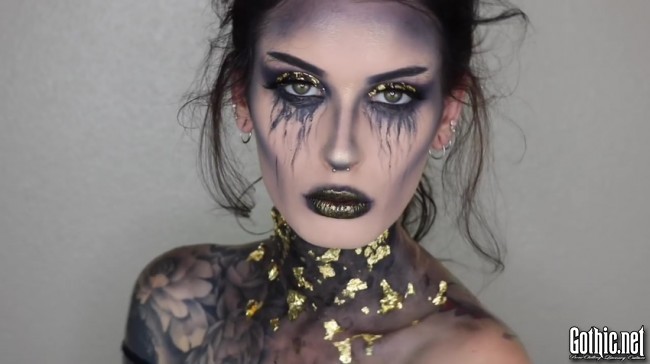
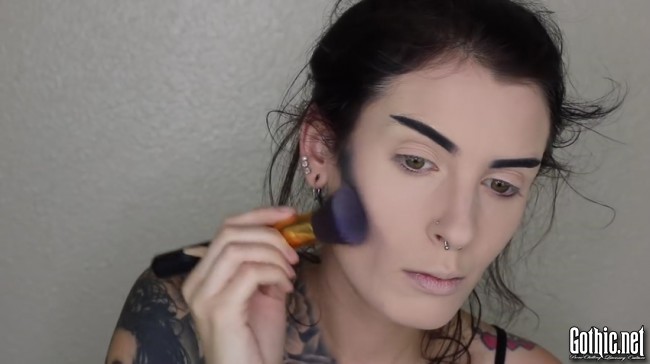
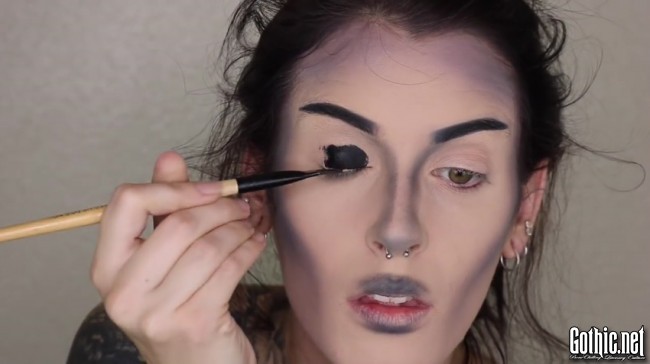

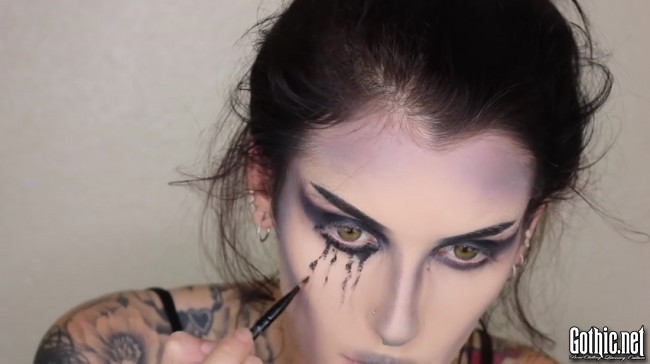
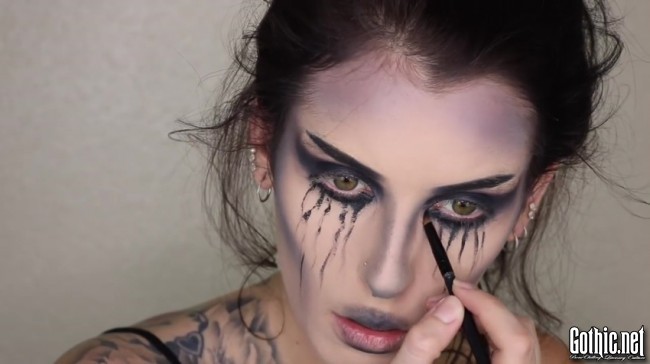
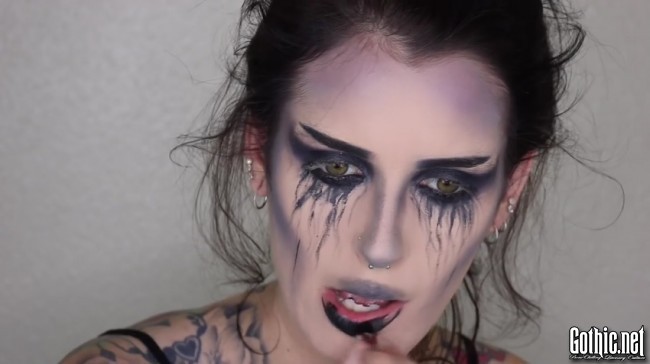

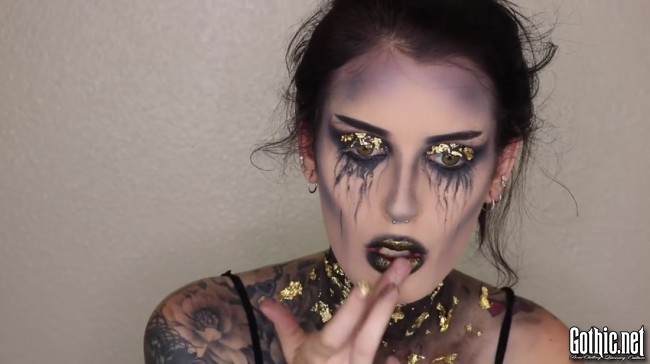

I hope you guys are enjoying the halloween makeup looks I’m doing I want to film a lot more so stay tunes for that. Also, I do post these looks on my Insta gram so go follow me on there @cassi.jene
THANK YOU GUYS SO MUCH FOR WATCHING AND DON’T FORGET TO SUBSCRIBE
PRODUCTS USED
morphs brushes 35M palette
NYX cosmetics black paint
KAT VON D black lipsticks in slayer
gold flakes from micheals craft store
( anything I do not list or say in the video I do not recommend but I am not a fan of wasting product so I use it anyways)
Panel of Experts: Do you feel it is better for a book or story to be classified as horror or mystery or literature? 16 Feb 2023 8:15 PM (2 years ago)
Question: Do you feel it is better for a book or story to be classified as horror or mystery or literature?
Yes! This feature marks the return of Gothic.net’s popular Panel of Experts series!
Part of the study of library science is figuring out how to categorize books to make them findable and comparable. Book classification can really impact which readers are likely to find the book a writer may have spent years crafting and perfecting. Sometimes a theme will definitely appeal to horror fans and people who read horror know to look in the horror section of their favorite bookstore, either online or in-person. Sometimes a story straddles themes of horror, suspense, mystery, or other varieties of stories, so how to pick a category? Some of the most popular horror writers (or at least who most people would consider popular horror writers) prefer to have their work classified as literature, because they believe they might reach a broader audience or be more likely to be reviewed in supposed serious venues. Some movie producers just might pay more for options on mystery/suspense versus horror. Some writers worry that editors will expect their work to be more formulaic if they are put in any category at all. Some writers just chafe under labels. Our experts weigh in on how they feel about literary classification.
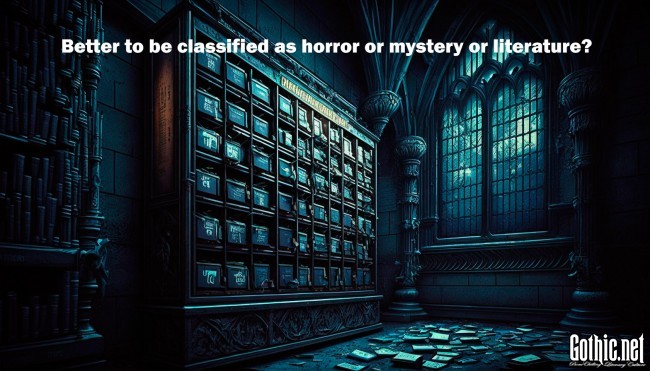
Mystery/Suspense is definitely more marketable than Horror. But who really gives a shit? The goal is to connect with an audience and whatever it takes is okay with me.
—Adam Pepper, writer
I don’t think there’s a better or worse, but horror still hasn’t redeemed its abysmal reputation in publishing.
—Alexandra Sokoloff, writer
I always really struggle with classification because I don’t like to be boxed in and some of my favorite writers produced really genre-busting and cross-genre work.
—Amelia G, writer
I don’t care about labels. I only care about the story. I think back cover copy is vital to selling a book.
—Angeline Hawkes, writer
I’m not sure. For the purposes of bookstores, it might be better to have the horror or mystery classification to help potential readers find work they might enjoy.
—Ann Schwader, writer
I’ve never been ashamed to write horror, but I do think a book being labeled as horror diminishes its chances of getting publicity.
— Anthony Izzo, writer
As much as people fight against classification, I think genre tags have a use. When I go to a bookstore, real or virtual, and I want to buy a mystery novel, I head over to the mystery section and browse the shelves. It’s more tightly focused than if I had to wander through the entire fiction section looking for a crime novel from among everything else. True, that means that I don’t accidentally stumble across something different, but that’s not a big deal to me. I have other ways of finding out about those sorts of books. The biggest issue, though, is when a writer produces something that defies easy classification. Something that blends genres or evades them. That gives publisher’s fits and may lead to a rejection even though it’s a perfectly good book.
—Bev Vincent, writer
HORROR
—Bob Johnson, writer
In the short term, either of the genre classifications. In the longer term, literature.
—Catherine Mintz, writer
I feel it is better for my book or story to be bought and read. Horror gets a bad rap, however, while literature sails off into the sunset. Mystery also gets a pass.
—Connie Corcoran Wilson, writer
All three if it fits the bill.
—Corrine De Winter, writer
AS GOOD OR BAD
—Del Howison, writer
If you want it to sell well I suppose Mystery is the best of the three. It is unfortunate but Horror is not usually a large section in bookshops.
—Derek Gunn, writer
I think it’s okay to classify a book as horror or whatever, but in book stores and libraries I think all fiction no matter what genre should be shelved together. Kafka next to King. Austen next to Asimov. Heinlein next to Hemingway. Find your favorites, but be open minded to all.”
—G. O. Clark, writer
I believe a book should be classified as exactly what it is, not what it should be or what the marketing department at the publishing house would like it to have been.
—Gabrielle Faust, writer
Sales-wise, seems to me Mystery or Suspense sells the best, with literary probably second, and horror the unwanted guest in the party.
—Gene Stewart, writer
Literature. But people being what they are, the reality is horror and mystery is what people look for and they don’t want to mix their vegetables, much less meat and vegetables, so everything must be kept separate and apart or else how will anyone get to read only what they’re looking for (in other words, only what meets their conservative requirements).
—Gerard Houarner, writer
‘Better’ from what perspective? Is it ‘better’ for a book to sell more but disappoint the readers? I think it’s probably best for a horror novel to be branded as such and literature likewise. The problem is when people read horror and belittle it for not being ‘literary’ (whatever that means). I note that no one seems to get much mileage from arguing that Anne Tyler would benefit from throwing a few serial killers into her books.
—Greg Stolze, writer
Speaking as an ex-librarian, some books are very difficult to categorise, which is often the problem in bookshops etc. Cross over books are some of the most difficult and the classic remain the same in that they can deal with all subjects, but are ‘classic’.
—Helen McCabe, writer
Good writing is good writing and shouldn’t be classified at all, except as good.
—Jameson Currier, writer
Re my own stories: I’m happy with a horror designation.
—Jean Graham, writer
Hard to say. It seems once an author has broken a major list, say the NYT bestseller list for instance, his books tend to be lifted out of genre and moved to the literature side of the bookselling aisle.
—Jeanne C. Stein, writer
I don’t know – I can only think of it from a marketing perspective, as nothing I write, to me, fits into any particular category; it’s always a combination of a lot of different genres, influences, and approaches. Genre designations are all about what section of the bookstore it goes into, and that limits what a lot of people are willing to read. It’s too bad; all those kids who loved Harry Potter books should really read The Count of Monte Cristo, but where are they going to hear about that?
—Jemiah Jefferson, writer
For me, it doesn’t matter. For sales, mystery probably would work best out of those choices.
—J. G. Faherty, writer
A great book, one that is so well written and timeless in any genre, I would consider literature.
—Jill Bauman, dark artist
I hate classifying anything generally, but I’m rational and understand it makes things easier for the sake of chroniclers and sales folks. I’d say Horror and Mystery can mix all the want—but who decides if something is literary? I certainly don’t. If a book entertains you and makes you think its literature, genre shouldn’t have anything to do with it.
—J. R. Parks, writer
A larger number of people will read something if it’s labeled literature, but horror fans are voracious and very loyal. I suppose it’s best to decide what your goal for a work is. Then again, you might not have much choice in its label. Scribner labeled Morbid Curiosity Cures the Blues as humor. While I find many of the stories very funny, if someone was looking for laughs, this wasn’t the book for them (as people have noted in some online reviews). I fought the humor label, but the publisher made the final decision.
—Loren Rhoads, writer
Better in terms of sales? Better for the writer or for the publisher?
—Lisa Mannetti, writer
It certainly doesn’t matter to me.
—Lisa Morton, writer
For me, it really doesn’t matter. I read a book based on the back matter—if it pulls my attention—or based on my prior enjoyment of that author’s work. Mainstream seems fond of the term thriller these days. I think some readers will be turned off by the label horror, just because horror fiction has gotten somewhat lumped in with bad horror films. But horror offers a great deal more variety than that.
—Louise Bohmer, writer
I know that I head straight for the horror section in a bookstore. I am their market and that’s an argument for keeping the horror label. Finding new readers who don’t understand that horror is more than Jason and Freddy, might find something new in a mystery or lit section. Equal arguments for both, but I don’t work in a bookstore so I can’t tell you what really works.
—Marcy Italiano, writer
In terms of sales, I suspect a book is better off being classified in any specific genre rather than as “literature.” Audiences of horror, mystery, romance, SF, fantasy, etc., know where to look for their preferred reading material. If a book is shelved with general fiction or literature, potential readers are less likely to find it unless the author is fortunate enough to get high-profile reviews.
—Margaret L. Carter, writer
I think it’s a shame there’s a need to classify any story, but I know it helps to know what type of story you’re picking up. For my own taste, I read across lots of genres, so don’t mind which. But I guess in commercial terms, mystery would sell more than horror – regardless of what the story actually was. Labels do just that – sometimes for better, sometimes not.
—Marie O’Regan, writer
When I go to a bookstore, I look first in the horror and SF sections – I don’t know why some people consider horror so disreputable… Bookstores where everything is just under fiction bore me, but some books do cross several lines and are harder to classify.
—Mark Onspaugh, writer
I think every writer would be happier if their work was viewed as literature, but in the Horror genre, there aren’t more than two living writers who have even fought to earn that distinction. Stephen King and somebody to be named later.
—Matt Kennedy, writer
I hate labels to tell you the truth. But it has to be done.
—M. F. Korn, writer
Unfortunately, I still see negative reactions from people to the word “horror”. If you took the same book and put it on two shelves – Mystery and Horror – I’d guess the mystery shelf would sell the same book more.
—Michael J. Hultquist, writer
Doesn’t matter for the enjoyment of reading. It’s only the marketing and sales that needs to badge it.
—Mick Sims, writer
I prefer a mixed classification. It broadens the reader base. But if I had to pick just one, I’d say Mystery – purely because there are more mystery readers than horror readers, whether we like it or not.
“Literature” is a whole different ball of belly button lint.
—M. R. Sellars, writer
I’d prefer all books to be just books on a shelf but classification is what publishers and bookstores want and presumably readers, or at least that’s the publishing industry’s justification for all the categories.
—Nancy Kilpatrick, writer
Sometimes, when I’m feeling really staunch, I think everything should just be classified as Fiction and leave it at that. However, many readers enjoy having separate sections defined by genre to help them find what they want. I’m not sure it matters in the end, though I’ve heard people say that horror novels sell better from the Fiction/Literature section than they do from a dedicated Horror section, probably because fewer readers go to the Horror section.
—Nicholas Kaufmann, writer
Most of my horror novels have been classified as mainstream fiction, and I don’t think it has hurt me. I really don’t think a category is as important as being able to find the book in a bookstore.
—Owl Goingback, writer
Regrettably the term horror now carries negative stigma- so I now apparently write dark fantasy, suspense, mysteries etc.
—P. S. Gifford, writer
I think it depends what kind of audience you’re trying to reach. For example the same people who really liked the Arrowhead books, which are marketed as SF, have read Gemini and although they liked it, preferred the post-apocalyptic stuff – and the same works in reverse. You might end up with several sets of readers, and although there will be a fair amount of crossover, those who read and like everything you do, there will be others who want to stick to just the one type of fiction you produce. So, I would imagine who you’re aiming a book at dictates whether or not it’s a good idea to call it ‘horror’ or ‘mystery’ or whatever.
—Paul Kane, writer
I feel it is often far better to be labeled “Fiction,” for the purposes of shelving in brick and mortar book stores. But that’s a double edged sword when the bulk of your readership goes directly to the horror section (and if they don’t have one…the Science Fiction and Fantasy sections). But I don’t get my panties in a twist about labels unless it’s really, really off base.
—Rain Graves, writer
While classifying a story as one thing or another can be helpful, I think it ultimately causes more harm than good. Because of classification, many, many great novels, films, and TV shows have gone undiscovered by a broader audience, which is really unfortunate.
—Richard Dean Starr, writer
Classification is really something I think better left to bookstores or publishers. As I said above, I tend to fly in the face of genre convention. The story is paramount for me.
—Rick Reed, writer
Better? I think it tends to depend on the book. I wouldn’t call my horror novel Downland anything except horror, to do otherwise would create a false reader expectation.
—Ryan M. Williams, writer
Whichever makes it sell better, and find its audience. Cross genre stuff can be tough. It’s often better, but doesn’t fit into an appropriate marketing peg.
—Sarah Langan, writer
No. I think it’s best for a book or story to be classified as good. Literature is fine. Literature usually means ‘good.’
—Shade Rupe, writer
Classifications can pigeonhole books, because some books like my novel The Kult are a mix of different genres such as horror, thriller, mystery and crime. I’m not one for labels, but I guess they help people find the sort of material that they’re into.
—Shaun Jeffrey, writer
Labels are useful enough; I mean, they certainly help narrow down your search if you’re looking for something scary. It’s unfortunate that the horror label has been essentially a trap, as far as retailers go. You don’t see horror sections anymore, and some writers applaud that, under the conviction that horror shouldn’t be “ghetto-ized.” There’s something to that, of course. For a long while, particularly during the horror glut of the late 80s/early 90s, if you wanted to read some real crap, just go to the horror section. Conversely, I miss having the scary stuff piled together because I could always find something appealing among it all.
—Stephen Mark Rainey, writer
If it’s predominantly horror call it horror, if it’s mostly a mystery call it that.
—Steve Calvert, writer
If its good, word of mouth will move it regardless of the heading. As someone said, “Talent will out.”
—Steve Burt, writer
I don’t like classifications. Is Dickens’ “A Christmas Carol” horror, inspirational, just a holiday story, or literature? The best stories will transcend any tags. Classifications are just so booksellers can put books with similar elements together to help customers find them.
—Steve E. Wedel, writer
I think books or stories should be called what they are, descriptively. Pretty much, only reviewers and critics who read widely and have a lot of interests are able to do that, because marketing categories are so narrow lately. I think “horror” and “mystery” are different art forms that cross over a lot, as with science fiction, heroic fantasy, urban fantasy — each genre has its different expectations, its different tools, and its geniuses.
I tend to like books that incorporate elements of more than one genre. I think a lot of readers like crossover work. However, the label horror seems to have been marketing poison for books since at least the 1990s.
—Thomas S. Roche, writer
In bookstores, it would be easier to find in specific sections. However, it may all be moot if bookstores go the way of the dinosaur.
—W. D. Gagliani, writer
Refined Vampirism – Makeup Tutorial 5 Feb 2023 3:55 PM (2 years ago)
For this tutorial, kitty smith has a bold look for you that’s so easy to put together with her guidance that you’ll be reaching for your palette as you watch it so you can recreate it as she shows you each of the steps required to accomplish it.
This look is a vampire style, and she achieves it by utilizing purple eyeshadows coupled with darker colors to accentuate the eyes. There’s a nice detail here, because while she goes with purple and recommends it for this tutorial, she also suggest some experimentation with another color of your choice, since the look also lends itself for variety.
She also adds some long false eyelashes, white highlights on the face and a deep-red lipstick that emphasizes the look, creating the imposing and alluring style of a vampire while keeping all the components modest enough so you can use this style on a daily basis if you choose to.


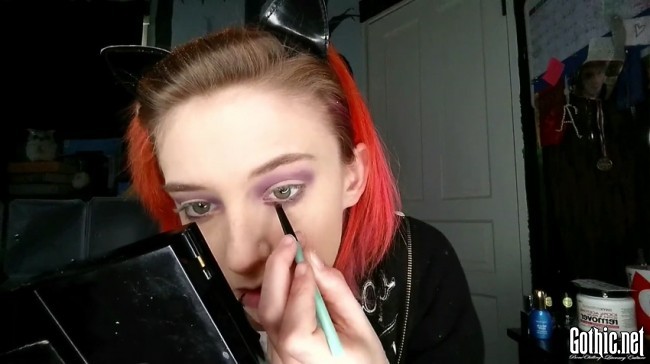
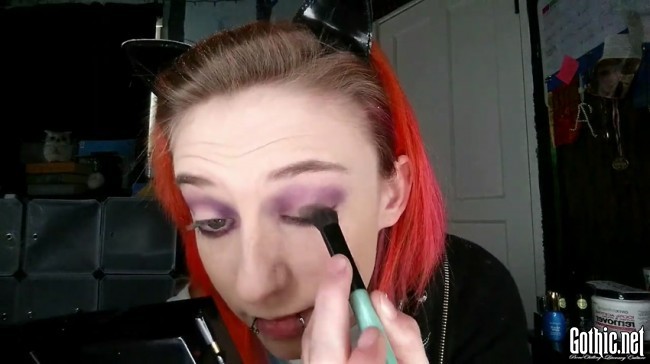
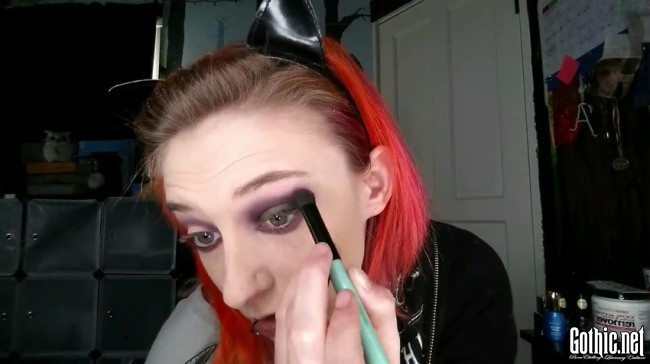

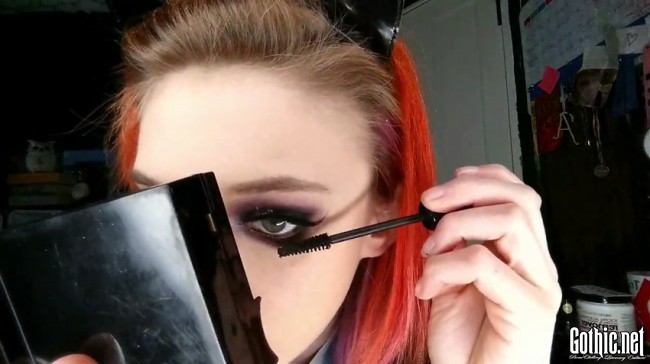
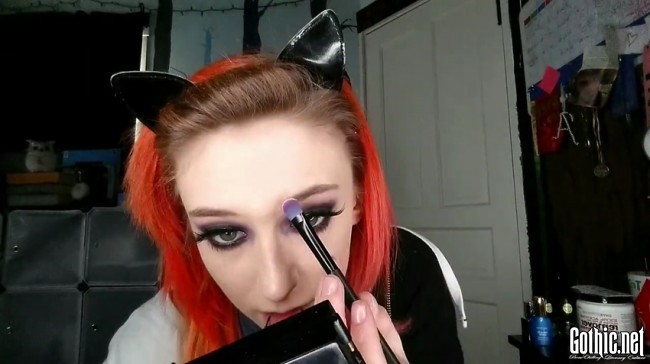
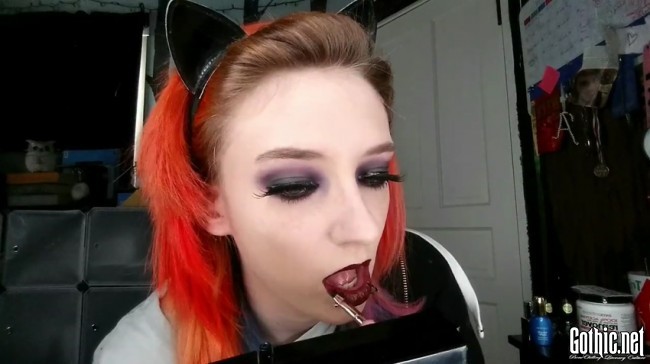

hi my little vampires, join me in this vampiric makeup look today!!
give this video a like if you enjoyed
and
subscribe to become a little vampiresocial medias
instagram:
bloodthirsty_fangs
https://www.instagram.com/bloodthirst…bloodthirsty_fangs2
https://www.instagram.com/bloodthirst…drawing_and_nature1
https://www.instagram.com/drawings_an…tik tok:
kittysmith3
http://vm.tiktok.com/JGftgc/
A Spectacle Of Radiance – Dark Makeup Tutorial 28 Aug 2022 4:06 PM (2 years ago)
An inventive idea by SchminkenGrime, this makeup tutorial shows you how to create a butterfly look for woodland picnics near haunted forests, and the result is so colorful and amazing, that it actually captures the radiance of butterfly wings, and makes you want to stare at it for hours, observing every hue, shade and color added to the look, from the thick lines that define the outline of the wings to the details and solid colors it presents on the sections that represent the wings themselves.
This accurate portrayal of a butterfly reminds you about the beauty of nature, how mesmerizing it can be, and above all, how beautiful a gothic look can be if you work with the right concept and apply the exact amount of attention to detail to create something exceptional, which is exactly what this makeup tutorial does, and why it is so marvelous.

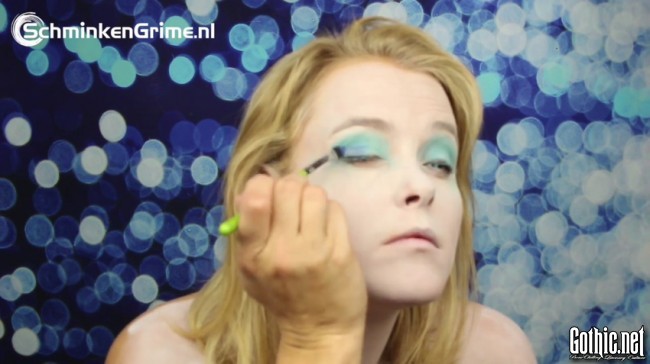
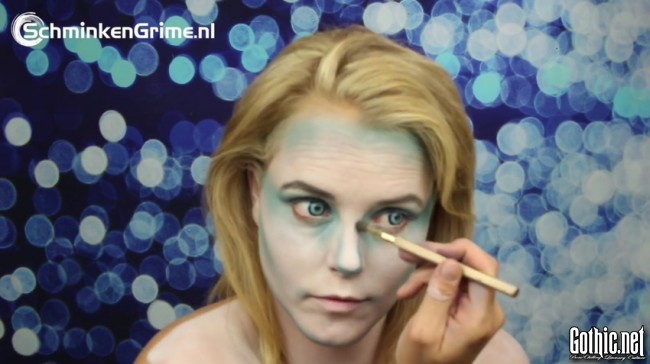
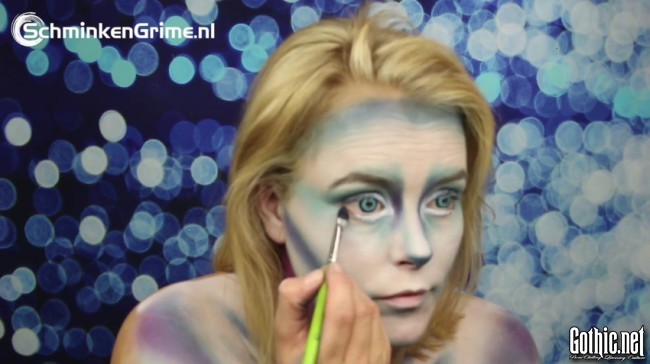
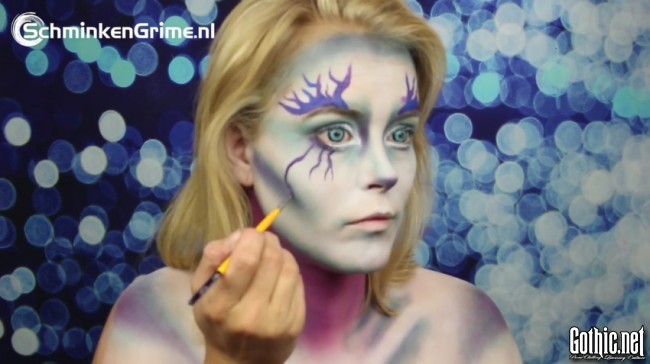
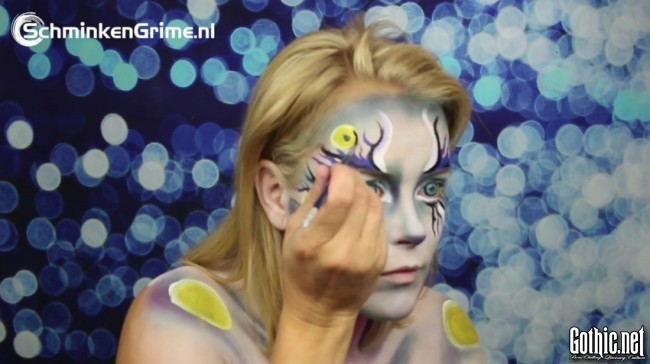


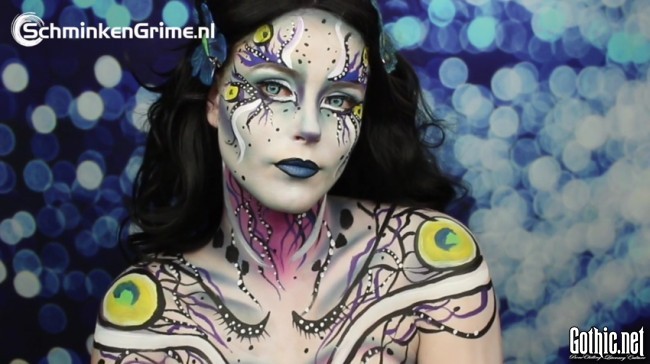
SUBSCRIBE to our channel for a new video every day in September and October ?.
Halloween Butterfly Face Paint Tutorial | Halloween Look | Halloween Makeup
If you want to check out more of Angelina’s work please visit her Instagram https://www.instagram.com/angelina_sc… or Facebook page https://www.facebook.com/angelinassch…. Angelina will be here on YouTube every 2 weeks on Tuesday during Halloween season. Let us know what you think of the video and don’t forget to give her the thumbs up.
We can also be friends on:
BLOG ‣ http://blog.schminkengrime.nl/
TWITTER ‣ https://twitter.com/schminkengrime
INSTAGRAM ‣ https://www.instagram.com/schminkengrime
FACEBOOK ‣ https://www.facebook.com/SchminkenGrime
